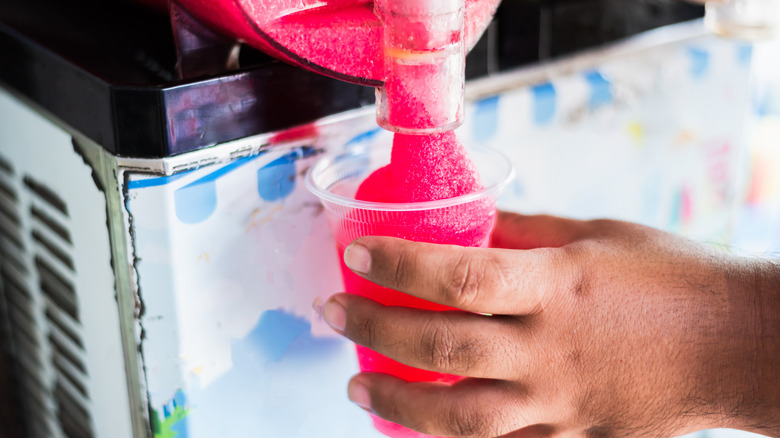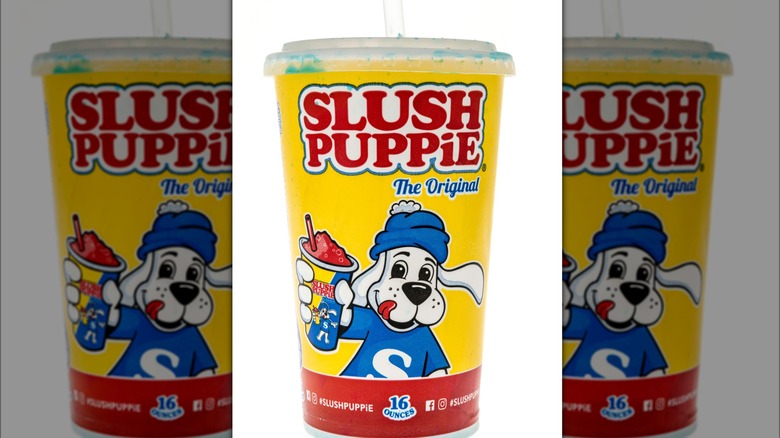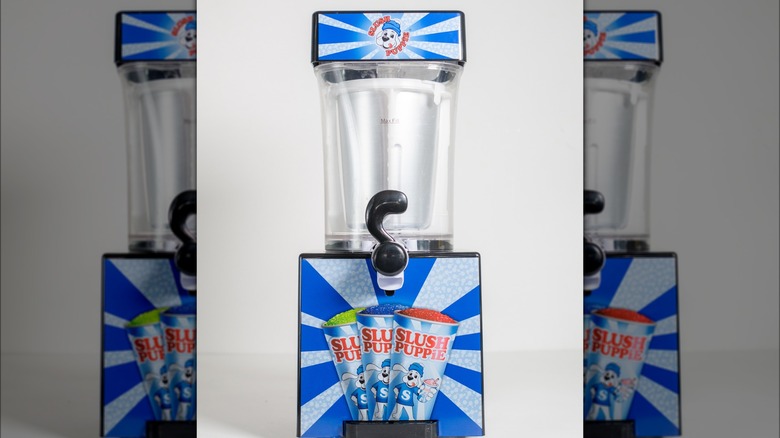Where In The World Did All The Slush Puppies Go?
If you grew up in the 1980s and '90s, you probably recall a certain cold, sweet, neon-hued beverage called a Slush Puppie. The fruity-flavored frozen treats were scattered all over America and beyond, in places like convenience stores, gas stations, K-Marts, and some movie theaters. Indeed, by 1998, nearly three decades after Slush Puppies were introduced, there were approximately 650,000 Slush Puppie machines operating in 62 countries. Today it seems they've all but disappeared. What could have possibly happened to the wildly popular childhood favorite?
In short, the company was acquired by ICEE, its major competitor, in 2006. And while there is still an active Slush Puppie website that claims the brand is developing, growing, and available in 50,000 locations globally, the drinks themselves have become really hard to find. It appears that Slush Puppie machines, syrups, even cups emblazoned with the beanie-wearing dog mascot can be purchased, no problem, but, clearly, that doesn't mean retailers are selling them ready-to-drink. Your best bet is likely stumbling upon them in a privately-owned business (think roller skating rinks, general stores, city recreational parks, or even some smaller convenience stores). You could, of course, purchase the equipment on your own, but that won't come cheap.
Peace, love, and Slush Puppies
The reign of the Slush Puppie began in 1970, a year when the hippie movement was still going strong, disco music was taking root, and Apollo 13 launched. That year, Cincinnati native Will Radcliff purchased an antique slush machine he found at a trade show on a whim. After some brainstorming with relatives, he came up with both the Slush Puppie name and what would be the company logo. All in all, Radcliff started his business with less than $1,000.
He already knew that he'd be competing with the ICEE brand, so to distinguish his company from it, he decided that his icy drinks would be made without carbonated liquid (unlike ICEE). Syrups and water were combined in slush-making machines where the mixture would freeze and churn. He initially offered four flavors of Slush Puppie, but that number eventually ballooned into 40 flavors, which included cotton candy, a possible precursor to Burger King's frozen cotton candy drink. By 1999, Slush Puppie was making $25 million a year.
Once 2000 rolled around, Radcliff was looking at retirement and sold his company to Cadbury Schweppes. It was then sold to J&J Snack Foods, the company that owns ICEE, in 2006. This may have been the time that Slush Puppie machines began to dwindle in places where fans were used to seeing them, no doubt replaced by the ICEE brand instead.
If you can't buy 'em, make 'em
The good news is that Slush Puppie brand syrups and supplies are readily available for anyone to purchase, from business owners to devoted fans of the drinks. The bad news is that the branded Slush Puppie machines are not wallet-friendly. They are undoubtedly for commercial use, which explains the hefty price tag, so if you own an arcade, a party rental company, or at least a really big rec room in the basement, it might make sense to keep one around if you can afford it. Used machines can be found for prices starting around $1,600 while new ones can run as high as $7,000.
That's not to say you couldn't use the syrups without the machine. If you have a snow cone maker, margarita machine, or even a high-powered blender, why not use the Slush Puppie syrups to build your own concoction? The results surely won't be exactly the same, but they might tame the craving if you can't find a vendor nearby that sells the ready-made sipper.


